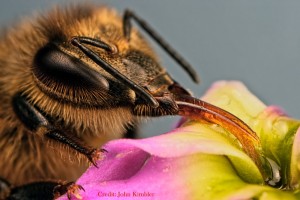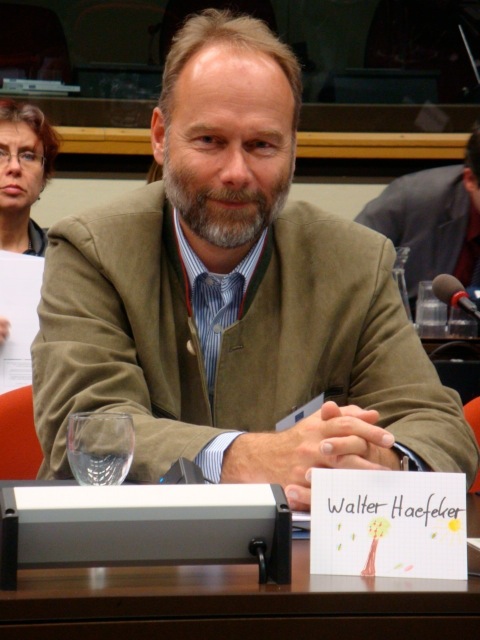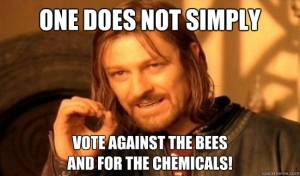Neonicotinoids: The New Buzz Word
The word neonicotinoid has now become a household name as people all over the world are speaking up and demanding that our pollinators come first before corporate profits. Such is the case, especially in Austria which developed gmo-free zones, widely supports organic food and cherishes its pristine farmland. Pollinator health is clearly a very important topic to the people of Austria.
Neonicotinoids May Be Hazardous To Political Careers
Neonicotinoids are a class of systemic pesticides with a common mode of action that affects the central nervous system of insects in ways both dramatic and subtle, causing paralysis and death. Neonicotinoids are often applied as seed treatments in which the seeds are coated before they are planted. The agro-chemical industry generates billions of dollars from neonicotinoid sales. The pesticides are available not only for agricultural applications but also can be found in a myriad of garden products available all over the world. The irony is, by design, neonicotinoids were created to kill insects, however, the agro-chemical industry still claims that there is not enough scientific evidence that these chemicals are responsible for the global decline of our pollinators. Politicians that side with industry are learning very quickly that supporting neonicotinoids may be hazardous to their career. Such is the case in Austria which is the focus of this interview.
Neonicotinoid News Suppressed By Mainstream Media In USA
Sadly, news about neonicotinoids is not a topic that is investigated thoroughly by mainstream media in the United States. There are random stories which pop up from time to time but never cite any of the independent, peer reviewed, published scientific research which prove the toxic impact on pollinators as well as the sub-lethal effects. Instead, media outlets cater to their advertisers by acknowledging the existence of these systemic pesticides but leave it at that. The blame for pollinator decline in every one of these stories is predictable as the sheepish journalists follow along, stating the ambiguous, all purpose, industry coined excuse,”Colony Collapse Disorder” with a brief mention of Varroa mites. Even Forbes has hopped on this bandwagon. Had any of these outlets done independent research on the subject aside from the crafted industry propaganda, they would find that there is no Varroa in Australia and despite this fact, beekeepers exposed to neonicotinoids are suffering horrific losses.

Regardless of how much independent scientific research has been published, Colony Collapse Disorder and varroa mites are the excuses industry uses to justify global bee losses.
It is basically up to the beekeeping community to circulate the information via email, social media, snail mail, advocacy meetings and online forums,etc. Hence the reason for the launch of the special series called “The Neonicotinoid View”, which I co-host with my friend, Tom Theobald who is a honeybee expert and pollinator advocate.
When news circulated across the pond about an embarrassing situation with the Austrian Minister of Agriculture regarding the vote to ban neonicotinoids, I reached out to Walter Haefeker, who is the President of the European Professional Beekeeper’s Association, to explain what happened.
WH: As you’ve covered in your show (The Neonicotinoid View) extensively, neonicotinoids have been an issue that beekeepers have raised for at least the last ten years as being extremely problematic to the health of honeybees and responsible for unacceptably high mortality rates about honeybees. After some pretty significant bee kill offs in Germany, France and Italy, some of the member states in the EU instituted local bans of some of the applications of neonicotinoids. That automatically triggered a review process of the European Commission asked the European Food Safety Authority (EFSA) to report back to them on whether there is scientific basis for these bans. EFSA came back first with three substances from the Neonicotinoid group said, yes, there is sound scientific basis for this. In fact, there is an unacceptably high risk to bees and also unacceptable gaps of information about the safety of these products. Now that the Commission had that information, they needed to make a proposal as to how to deal with this unacceptably high risk. In Europe, one of the core principles is the Precautionary Principle, so, they invoked that. After that, we had a huge lobbying fight because the Commission made a proposal for pretty significant, partial bans of three neonicotinoids, EU wide and in the first round of voting, they didn’t get enough votes to get it passed right away. They submitted it again. This is a pretty standard procedure and there are slightly different voting rules when they go through this appeals process.
In this appeals process, there was enough support from the EU member states for the proposal by the Commission that they actually were able to implement it. Recently, they announced in detail what they are going to implement. So, that is very good news!
An Encore Presentation, Courtesy Of Fipronil
JS: Just when beekeepers thought progress was being made, yet another chemical is stirring the hive- Fipronil! What next?
WH: There is another substance that is not out of Neonicotinoid group chemically but is causing similar problems. It is called Fipronil and EFSA has just released their report on that. So, we will probably go through the same process again for this fourth substance (and there are more coming!)

Fipronil, the next broad-use insecticide that beekeepers are concerned about is used as a treatment for sunflowers.
Austria, in this process, is quite interesting because on the one hand it is one of the smaller countries in the EU but maybe because of that, after some of the other countries like France, Italy and Germany implemented bans, the chemical industry said to the Austrian government, we are going to make sure that everything is done right in Austria to use these products safely. The Austrian government bought into this process. So, they basically did not institute the ban back then. Instead they instituted a monitoring program where as soon as a beekeeper suspected that there was something going on in relation to neonicotinoids, a team of scientists would basically document that case and find out whether or not it was due to pesticide use. So instead of proving the point of industry that in fact, if you do everything right (if the farmers are properly trained, if the seed treatment is properly applied, if the equipment for seeding is right) you can avoid bee losses. They proved that even in a small country with a lot of effort to do it right, it is impossible to use these products safely.

Austria’s gmo-free zones
Bee Careful How You Vote
JS: One of the biggest issues commercial beekeepers, bee health advocates and concerned citizens have is getting support from elected officials. In Austria, regardless of how strong a politician’s ties are to industry, the people still have the power! What were the circumstances which lead to this public outcry?
WH: The Minister of the Environment and Agriculture (in Austria, it is the same ministry in charge of both) was always very close to industry. When it came to voting on the Commission’s proposal prior to the actual voting, he announced that Austria would vote against the proposed ban.
What was interesting was that he made this announcement when, for example Germany had already announced that they would support the proposed ban and Germany made this announcement because they had realized that in their backroom activities, they were unable to organized a (qualified) majority against the Commission. The German government, we know from a lot of sources, tried very hard because there are a lot of German companies like Bayer and BASF in this business big time. They tried to organize a majority against the ban. When it was clear that they wouldn’t have the votes, they decided that they didn’t want to take a public flogging over voting for chemicals against the bees. So, they announced that they would support the ban and pretend that they were always for it. This is not very ethical but very smart politically.
Now this Austrian minister, Nikolaus Berlakovich, ÖVP, announced at a point where it was clear that the votes wouldn’t be there to stop the ban that Austria would vote against the proposal of the Commission supposedly to help the corn growers in Austria. Then what he probably didn’t anticipate was there was this huge public outcry because Austria prides itself in being pro-family farming, pro-organic farming, anti-gmo. Everything that the world knows, Austrian consumers know about the farming policies is to avoid huge mono-cultures, support family farming also in higher alpine elevations and things like that, promote organic, etc. It didn’t make sense to the public at all why, especially, Austria would vote against this ban. This outcry was so bad. The other political miscalculation he made the announcement the day before the official start of the election campaign season. There are elections in Austria this fall. It became the number one or number two election issue right away that this guy had decided to vote against the bees and for the chemicals.
There was a vote of no confidence in the Austrian parliament. He only survived because the governing coalition said hey, we are going to have elections anyway in a few months. There is no point in changing horses right now. Essentially this guy became a huge problem for his political party. So, his party leadership forced him to make another announcement. He went in front of the press and said that he supports the ban now.
The Walking Dead
WH: What is significant about this also is that here you have a minister of agriculture who essentially lost his job over voting against a measure to protect the bees. He is formally still the Minister of Agriculture in Austria right now but everybody in Austria knows that even if his party wins, he is not going to be the Minister of Agriculture in the next Austrian government. They call him “the walking dead”!
JS: It is interesting that he would even try to push that agenda, especially since Austria is known for protecting its pristine farmland. As you pointed out, Walter, they have several generations of family farmers that are there. One of their biggest exports is their agricultural products which are unique to that particular region of Europe. I remember there was a huge battle over the battle to state that the pumpkin seeds that were grown in Austria’s Steiermark were from the Steiermark. You had other countries that were basically trying to cash in on the demand for this highly sought after commodity, if you will. It was a very big battle. The Austrian government put its foot down and said unless it is grown in the Steiermark and has the seal of the Steiermark, you cannot say it’s from that region.
WH: The Austrian government, when it comes to gmo’s, even though formerly, it is illegal in the EU to have a government ban on gmo’s, they decided to do it anyway. That is an earlier government. This position is so popular in Austria, that you see signs on food in supermarkets and trucks from supermarket companies that they are proud to be gmo-free everywhere! So, anyway, the EU Commission tried to sanction the Austrian government for their illegal ban of gmo’s and they could not get a majority of the other member states to support sanctions against Austria. That was a pretty risky route for Austria to take but they had the courage.
Austria has some pretty interesting approaches. For example, they have the safest nuclear power plant in the world. It’s the nuclear power plant in Zwentendorf. Because the Austrian public was very much against nuclear power, this plant was built but never put into operation. It is a museum now. That is why it is the safest nuclear power plant in the world. Given the history and some smart decision making of Austria, nobody could understand why this minister was casting a no vote at a point where it didn’t make sense and where it didn’t really reflect Austrian values.
JS: There is a lot of information that is being circulating but the bottom line, Walter, is that when it comes to protecting the environment, especially when you have family farmers whose livelihood is at risk, the people have enforced their needs and what they want for their country. I think it is a great example for other countries to follow.
WH: Yes! I think and also this Minister is an example because you could see that his colleagues from the other member states, including our Minister of Agriculture in Germany. They basically watched this guy walk into a blender. He is kind of an example.
JS: Clearly, his staffers did not do their job and give him the heads up that this is not going to happen. He basically committed political suicide.
WH: Yes, he essentially committed political suicide at a point where doing this was completely pointless.
Bee Health Debate At 17th Annual EFSA Colloquium
JS: Do you think this will send a message to other politicians?
WH: One thing that I should probably mention is that we had an EFSA workshop about bees and pesticides. We think that the ground is shifting right now in the favor of protecting the bees better. There were people from USDA and EPA at the conference in Parma.
A few weeks ago there was a EFSA colloquium on bees and pesticides. The European Food Safety Authority held its 17th Scientific Colloquium, on “Low Dose Response in Toxicology and Risk Assessment”.
It was actually an international event where also people from US, EPA and USDA participated and it was quite clear that when neonicotinoids were originally approved in Europe and around the world, the tests to determine the risks for bees were obviously and completely inadequate. So, EFSA did not only re-evaluate these products to then cause the Commission to institute this ban but they also organized this workshop to bring in the science. What do we know about these risks and how can we better assess these risks going forward? From my perception, we are going to have changes to the rules for pesticide approval. They are going to be a lot more strict. They are going to look a lot closer at honeybees but also bumblebees and other important pollinators. I think this signal that is coming from Europe will be heard in other countries and maybe change the regulatory system in other countries as well.
Listen To The Full Interview
In this special series called “The Neonicotinoid View”, host, June Stoyer talks to Walter Haefeker, President of the European Professional Beekeeper’s Association, to discuss a recent situation that occurred in Austria regarding the Minister of Agriculture’s vote to ban neonicotinoids which let to a public outcry. Please listen to the full interview below:
©2013 The Organic View Radio Show. All rights reserved.




When will US politicians take action? Clearly the EPA is useless. Perhaps the American public can learn something here from the Austrians.
I saw that article in Forbes as well. Advertisers are king! Who said America has no royalty? Mad magazine produces better content these days.
Lamestream media is too busy with the Treyvon case to discuss anything else. Thanks for letting us know that people are making the right changes in Europe. It gives me hope!
The hills are alive with the sounds of Austrians screaming! lol The Minister had better move. I bet he is a popular guy in his neighborhood.
Canada should pay attention to this too! We are in deep trouble up here. Neonics need to be banned!
One simply does not contribute to the global poisoning of the entire earth, precious!
Neonicotinoids poisoning is a path we all must take….that is till the EPA wakes the Hell up already! Either do something or disband!
Very true! Glad to see LOTR fans comment! Loved the Boromir reference!
EPA is just as useful as flat shoes on a hobbit!
So, the USDA and EPA are attending these bee related events. That is great but what is the point if they are not going to do anything? Are they there to get tips from the pro-nickers as to how to further poison us?
All we are saying is give bees a chance!
If a country like Austria can have the public react like this, it makes me wonder why the public in the USA has not reacted if they are so concerned about the environment, gmo’s,etc. When will Americans wake up? What will it take for Americans to stop buying the chemicals, stop buying Bayer’s products and stop killing the very environment they need in order to live? When???
Did you really expect Forbes to write anything of value? Take a look who is on their list of the most wealthiest people in the world. This is who you are fighting. They are not going to go against “the family”.
Way to go people of Austria! We need aggression, not people who are going to remain asleep. Wake up people! The bees are dying. We are being poisoned and are doing nothing! We need to get rid of the EPA and take back control of our government!
I find it interesting that there is so much attention on the Treyvon Martin case but yet we have a serious issue with national food security that affects ALL races! The media clearly does not give this any attention as you have pointed out.
I read the Forbes articles. Talk about misinformed! It just goes to show you that money does dictate what winds up in print.
“They basically watched this guy walk into a blender. He is kind of an example.”
I can just hear David Letterman: This guy walks into a blender….wait a minute! He did! DOH!
Very interesting how things work behind the scenes. I’ve been following your shows and appreciate the quality information. I have learned a lot, esp about what the reason behind Colony Collapse is really about. It makes sense that they would have an all purpose excuse to CYA!
The walking dead…sounds like a new reality show!
I hope that what happened in Austria gets around to the people in Canada. Sounds like they need a miracle!
Fipronil is really nasty stuff! This never ends!
Great interview! I’ve been following you for a while now. It is interesting that pompous ass politicians can STILL get what is coming to them BEFORE they leave office!
What will be interesting to see is how Canada and the US take action AFTER the world has done so.
Big Ag has BIG Dreams..to poison us for profits! This is never going to end until we change the laws!
I’ve been following you all over sm- twitter, facebook and pinterest. Found you on pinterest from your board on neonics. Great images, as always! I especially loved the meme for One does not vote against the bees and for the chemicals! Genius, June! You are a gem!
50 years ago Rachel Carson raised the world’s consciousness to the hazards of thoughtless blanket use of pesticides – yet we seem to have learnt nothing about the complexity of ecological interactions and the risks of interfering with delicately balanced systems.
As I drive around nowadays, my windscreen is no longer spattered with dozens of insect corpses as it used to be when I started driving 5 years after “Silent Spring” was published. They’ve nearly all gone, mainly due to excessive pesticide use which we all subscribe to when we reach for the can that “Kills all Creepy-crawlies”.
Whilst there may be some justification in pesticide use for crop protection, the neonicotinoids behave much like flame-throwers, indiscriminately killing many insect species that do not harm crops – indeed they may well kill insect predators that otherwise benefit human food production. Killing bees and other pollinators isd more than enough reason to ban them and related products until it becomes possible to develop precisely species-specific treatments to eliminate just the critical pest – and even then, there must be a careful watch for “unexpected consequences”. We nearly all carry DDT in our bodies from its excessive use in the 1940s and I would dread to think that some interaction with several years’ exposure to the rich soup of later pesticides might lead to serious consequences for human health.
It’s not my first time to go to see this web site, i am
browsing this web page dailly and obtain fastidious information from here every day.
Stop by my web-site <a href="[Link deleted]to website optimization